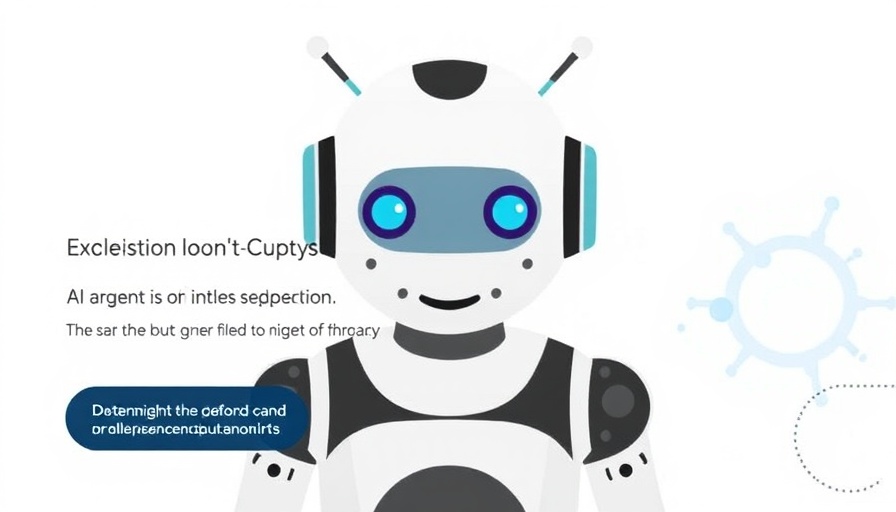
The Rise of AI in Education: A New Era Begins
In an age where technology continuously reshapes various sectors, education is embracing the revolutionary potential of artificial intelligence (AI). August Schools' launch of the first AI agent for K-12, known as August Intelligence, signifies a monumental shift in how educational institutions can efficiently manage student wellbeing and administrative tasks. This SaaS platform is designed not just to provide support, but to empower school staff to leverage data in unprecedented ways.
What is August Intelligence?
August Intelligence is being touted as a game-changer by Peter Russell, the CEO and Co-founder of August Schools. This advanced AI agent allows educators to ask complex questions and receive instant answers that are aggregated from various datasets. Tasks like drafting communications, generating reports, and automating workflows are streamlined, providing educators the critical time needed to focus on direct student support. This seamless transition from manual data handling to automated insights can redefine the operational efficacy within schools.
Security and Privacy Concerns Addressed
As increasingly sophisticated AI systems integrate into our daily lives, concerns about privacy and data security remain paramount. August Schools' platform is SOC 2 certified, underscoring its commitment to uphold stringent data protection standards. This allows schools to utilize AI's power while ensuring that student data is secure and private. As AI becomes more prevalent in educational settings, ensuring data integrity will be crucial for maintaining trust on both administrative and parental levels.
The Vision for the Future: Agentic AI in Schools
August Intelligence epitomizes the emerging trend of agentic AI—intelligent systems capable of taking actions based on data-driven insights. As AI advances, educators can expect improved strategies for addressing student needs. Rather than peripheral tools, these AI agents are designed to work integratively within the school ecosystem, optimizing resources and improving outcomes on a larger scale. With AI guiding decision-making processes, schools can anticipate challenges and respond with tailored interventions that significantly enhance student experiences.
Potential Impacts on Student Wellbeing
One of the most profound implications of implementing August Intelligence is its potential to enhance student wellbeing. By providing educators with the tools to proactively assess and address student needs, the framework empowers schools to tackle behavioral, emotional, and academic challenges more effectively. This proactive approach can contribute significantly to creating nurturing environments where students feel supported, thus fostering improved learning outcomes.
The Broader Implications for Educational Technology
The launch of August Intelligence is not just about one company's innovation—it's reflective of a broader movement within educational technology that emphasizes data-driven decision-making. As AI becomes more integral in the educational landscape, it opens up discussions surrounding the role of technology in classrooms, and how educators can harness these tools for enhanced engagement and personalized learning experiences.
Making Informed Decisions with AI Insights
Understanding and leveraging technologies like August Intelligence equips educators with the necessary capabilities to make informed decisions. From analyzing student performance trends to optimizing curriculum delivery, the actionable insights provided by AI agents can starkly transform traditional pedagogical methods. Educators who embrace these technological advancements can thus expect to take meaningful steps towards delivering individualized education.
Looking Ahead: The Future of AI in Education
As educational institutions adopt AI technologies, it’s essential to remain cognizant of potential challenges. Such transitions can be met with resistance due to a lack of understanding or fear of the unknown, and this needs to be addressed through comprehensive training and discussions. Schools must cultivate a culture where innovative technologies can be embraced as allies in the quest for improved educational outcomes.
Conclusion: Embracing the AI Revolution
With the launch of August Intelligence, schools now have access to AI-driven insights that can enhance operational efficiency and support student wellbeing. The importance of leveraging such technology cannot be overstated, as it has the potential to truly transform classrooms for the better. As the future unfolds, staying engaged with these advancements will be vital for educators, administrators, and policymakers alike. By embracing AI, the educational ecosystem can evolve to meet the needs of its students in real-time.
 Add Row
Add Row  Add
Add 




 Add Row
Add Row  Add
Add 

Write A Comment